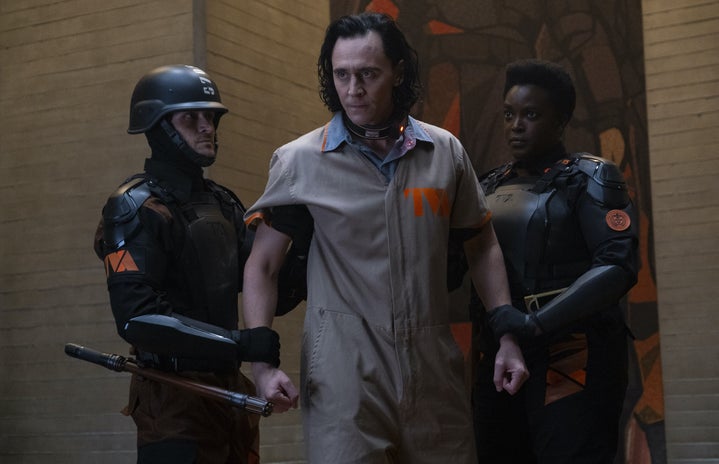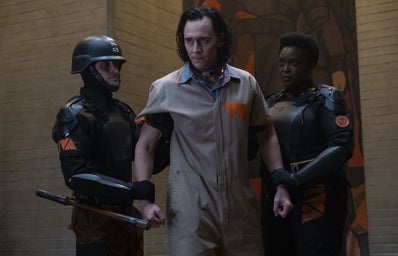On June 23, popular Marvel Cinematic Universe (MCU) and Disney+ character, Loki, came out as bisexual. The beloved God of Mischief is the first major character in the MCU to be inducted into the LGBTQ+ community. Loki’s sexuality, finally confirmed on-screen, is something that previously only existed in the comics, as the Asgardian trickster is depicted as queer in various publications. But since the character has been a fan-favorite in the MCU for a decade, audience members are also questioning the motives behind Disney’s decision. Why now? Shouldn’t this have happened 10 years ago?
In the Loki’s third episode, Lady Loki (played by Sophia Di Martino), now known as Sylvie, asks Loki about love — and if there were “princesses or princes” waiting for him — to which he replied, “A bit of both.” Loki director Kate Herron took to Twitter to celebrate the acknowledgement, sharing that it was her goal to confirm that Loki is indeed part of the LGBTQ+ community, once and for all.
“I know this is a small step, but I’m happy, and my heart is so full, to say that this is now Canon,” she wrote.
Loki’s identity has long been a core part of his character, even before his sexuality became public knowledge. In a 2021 interview with Out Magazine, Tom Hiddleston confirmed that he found out about Loki’s identity in 2011, when he was first cast in the role. The actor added that Loki’s sexuality even impacted the way he chooses to portray him. Until now, the character’s bisexuality was an implicit part of his personality, but was never mentioned on-screen.
“I’ve never felt better about how a queer character has been acknowledged in the media.”
Loki’s “coming out” episode also incorporated pink, purple, and blue colored filters, and fans are theorizing the coloring is a way to represent the bisexual flag. This extra, small gesture went a long way towards making queer audience members feel seen and appreciated. Georgina, 18, feels that the MCU’s confirmation of Loki’s sexuality helped her feel validated in her queerness. “Hearing Loki say ‘a bit of both’ so naturally struck me like lightning, in the best way,” she tells Her Campus. “I already knew Loki was canonically bisexual in the comics, but hearing him finally acknowledge it in the MCU made me so unbelievably happy. It’s like people are finally recognizing a part of who Loki was and has always been. It made me incredibly proud and made me feel valid.”
According to GLAAD, only 8 percent of television characters are LGBTQ+. The representation is even lower for bisexuals specifically, since they represent only 26% of all LGBTQ+ characters. As members of the LGBTQ+ community have grown vocal about bi-erasure in pop culture, companies and production houses have felt the pressure to prioritize bisexual representation — in June, The Bachelor franchise announced its first bisexual contestant. Could something similar be happening to Loki?
“I personally think that Loki’s coming out scene was one of the purest and truest forms of representation I’ve ever seen,” Georgina says. “I’ve never felt better about how a queer character has been acknowledged in the media.” For Georgina, the confirmation was special because it was simple, and not overstated.
However, some fans are questioning why it took so long for Loki’s sexuality to be confirmed, when he’s been an integral character in the MCU for a decade. Audience members questioned whether Marvel was confirming Loki’s sexuality because they were pandering to their viewers now that a lack of representation can hurt a production’s viewership and profit margins. Bryanna, 27, a transgender and non-binary content creator, tells Her Campus that the episode felt like queerbating. “It’s a step in the right direction,” she says. “But it’s not there yet. The LGBTQ+ community is constantly seeking representation and production houses give us crumbs.”
“My life experience can not be summarized by a throwaway line. A single line in a six hour show is so far less than the bare minimum. I am not happy and I demand more.”
Bryanna isn’t alone in her analysis of the episode. Martin, 32, felt disappointed by the show’s depiction of the coming out process. “It was a throwaway line, something to throw at us fans, so we could be content,” he tells Her Campus. “My life experience can not be summarized by a throwaway line. A single line in a six hour show is so far less than the bare minimum. I am not happy and I demand more.”
So, where does the MCU go from here? Is it too little, too late to incorporate Loki’s sexuality into his character? How can the creators of Loki honor his character without falling prey to queerbaiting? Despite falling short for many queer fans, others felt supported and celebrated by the character’s admission. Bi representation is so few and far between in mainstream media, that while the MCU and Disney+ may have been motivated by the wrong reasons, does it really matter if it helps even a handful of queer fans feel seen?
“That episode made me so incredibly proud to be queer,” Georgina says. “With just one line, Loki made me want to come out to the world, too.”
Studies Referenced
GLAAD. (2019) Where We Are On TV.


